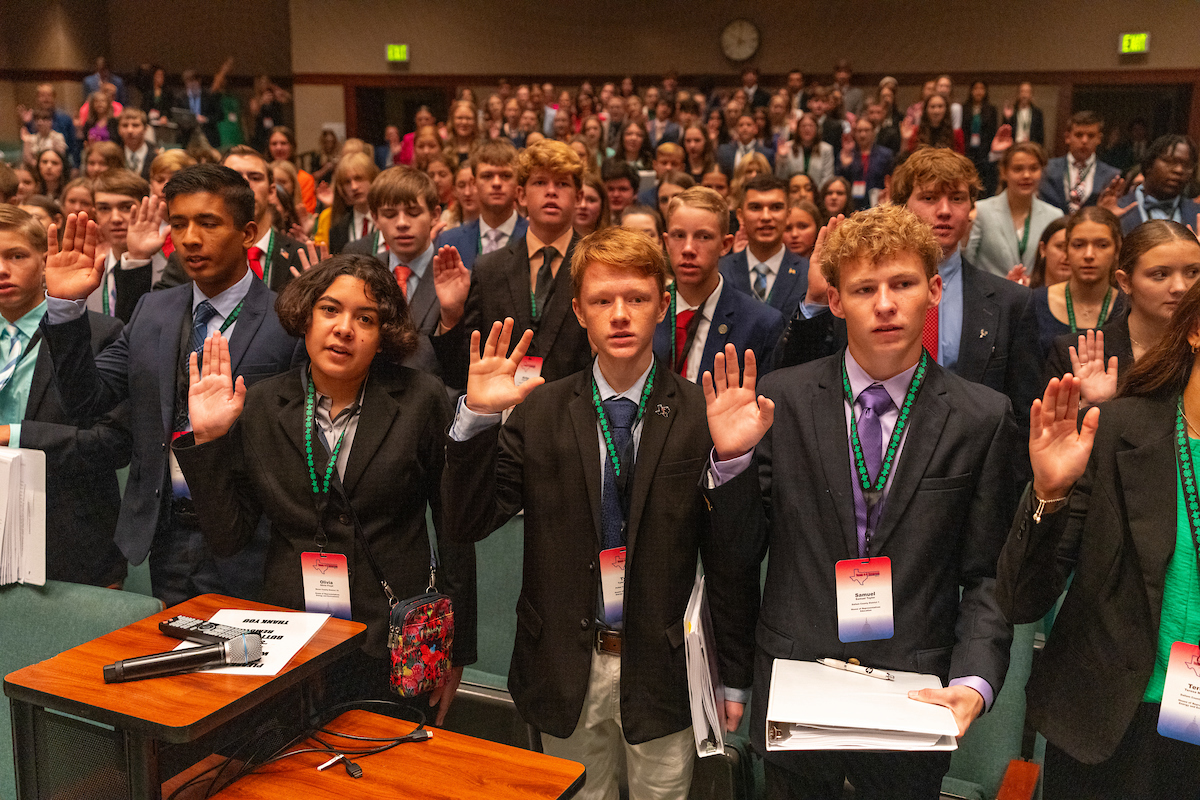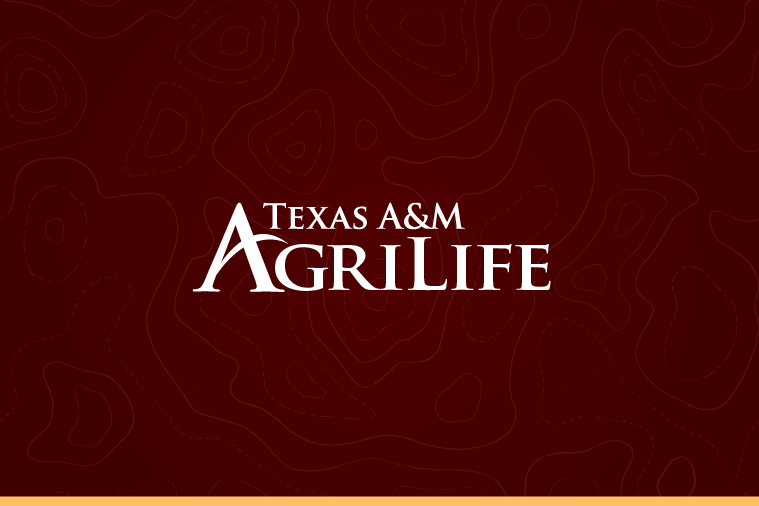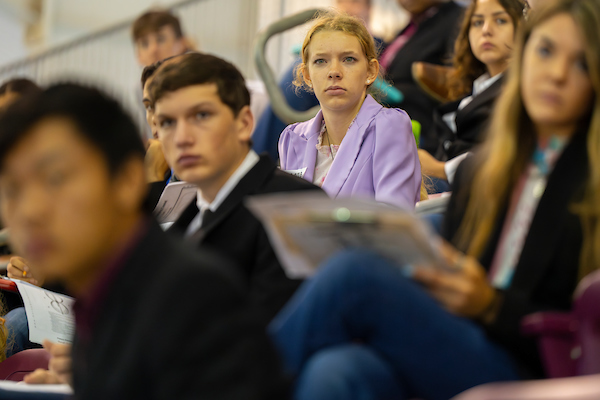Animal science judging clinics provide hands-on learning and skills to youth
Four competitive teams in the Texas A&M Department of Animal Science hosted 1,600 aspiring young judgers for clinics
It was a Saturday full of hands-on learning as 1,600 Texas 4-H Youth Development Program and Texas FFA youth and families visited Texas A&M University to learn during judging clinics hosted by four competitive judging teams in the Department of Animal Science in the Texas A&M College of Agriculture and Life Sciences.
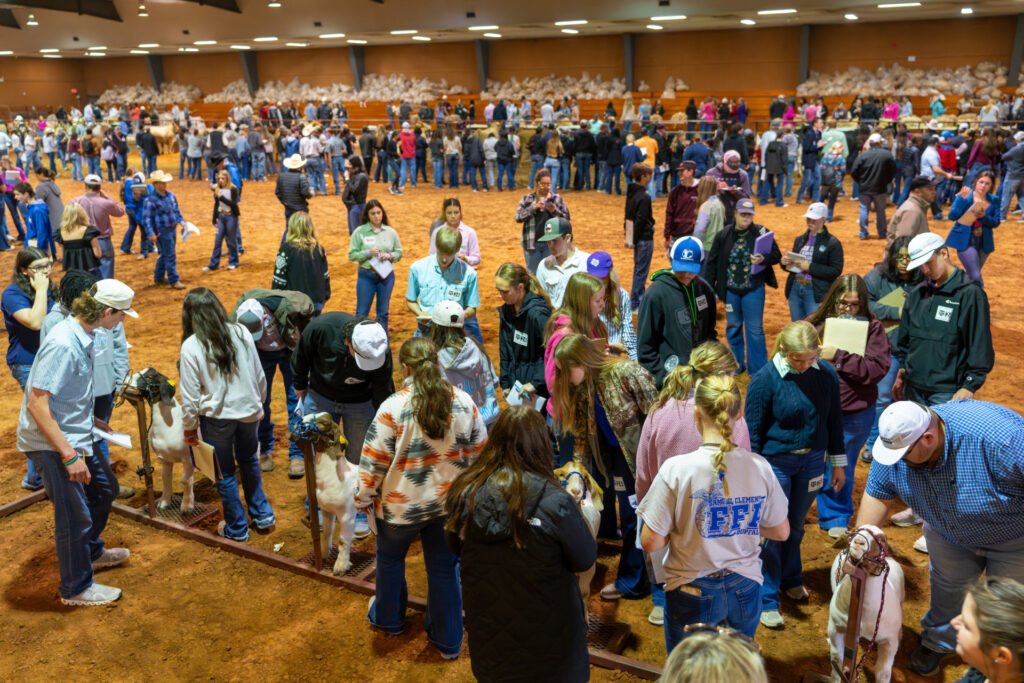
Coaches and team members from the current horse, livestock, meat and wool judging teams transitioned from judgers to educators during the half-day clinics to promote learning, interest and skills for the next generation of young judgers.
“These clinics are a great opportunity for youth to sharpen their judging knowledge and learn new skills to help them be competitive in their upcoming Texas 4-H and FFA contests,” said Shawn Ramsey, Ph.D., assistant department head for academics in the Department of Animal Science and Texas A&M Wool Judging Team coordinator, Bryan-College Station. “The best part about teaching these kids is seeing the ‘light’ come on when they learn something new or understand the methods.”
Clinics teach skills, replicate upcoming contests
The clinics are designed as typical Texas 4-H or FFA judging contests to prepare students and their coaches ahead of the spring judging season. Members of the 2023 National Champion and the 2024 Reserve National Champion Wool Judging teams taught the wool judging clinic, focusing on grading and evaluation with six classes and a 30-fleece grading rail.
The fast-paced clinic provides valuable resources to youth and their coaches while offering a glimpse into the world of judging at Texas A&M.
“Students become more competitive after our clinics and other similar programs,” Ramsey said. “They also become excited about the chance of being on a judging team at Texas A&M.”
The same sentiment was echoed by Caleb Boardman, lecturer and Texas A&M Livestock Judging Team coordinator, Bryan-College Station.
“The livestock judging clinic is a great platform to welcome students and families to campus and provide exposure to our program and facilities,” Boardman said. “Many of the youth will eventually become animal science majors and even members of the livestock judging team.”
Boardman and members of the 2024 Texas A&M Livestock Judging Team provided 12 livestock rotations to evaluate.
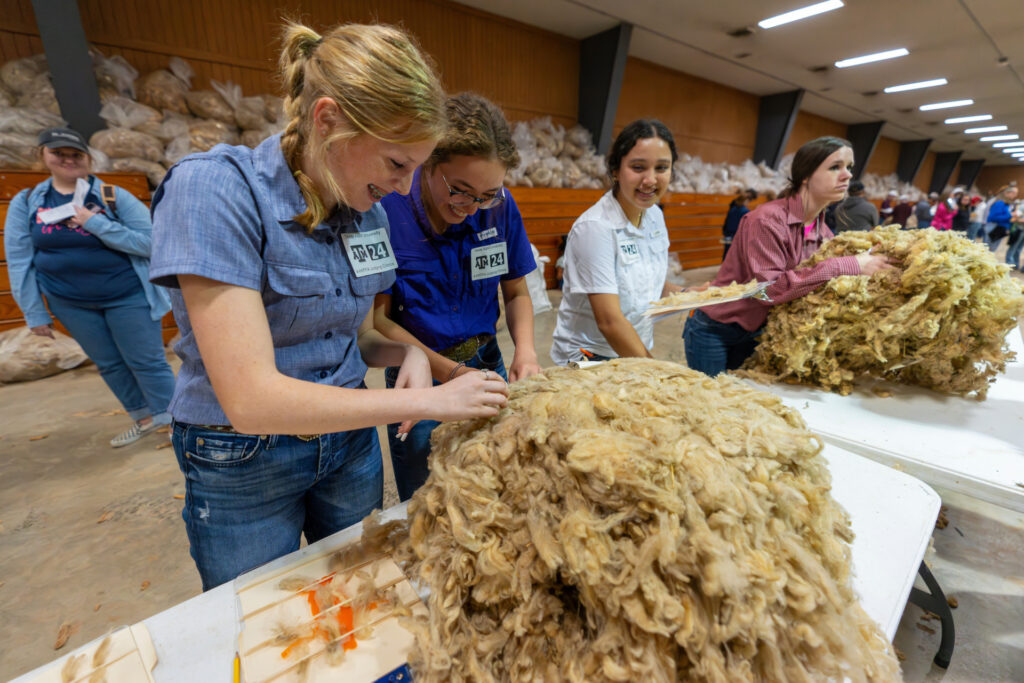
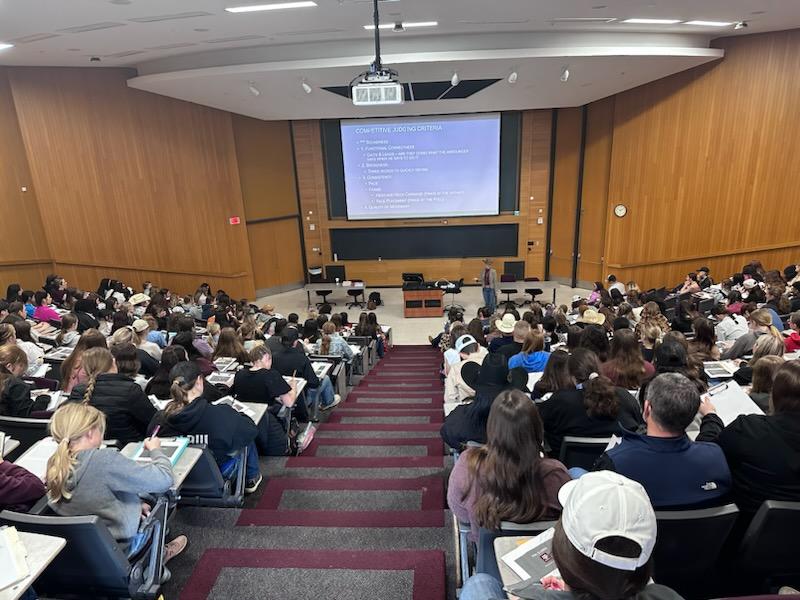
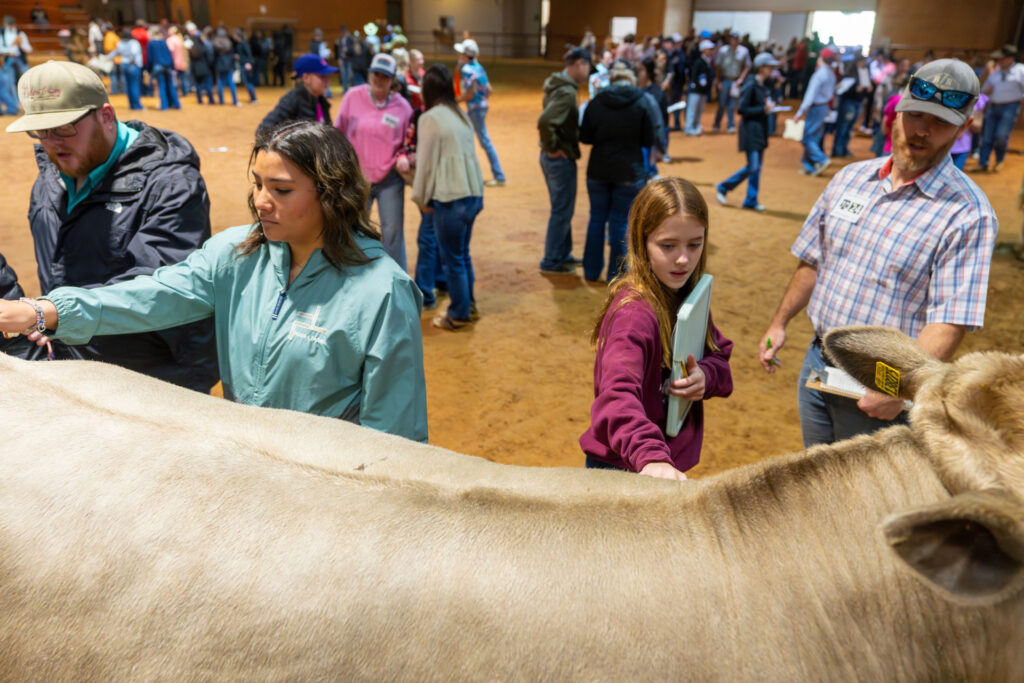
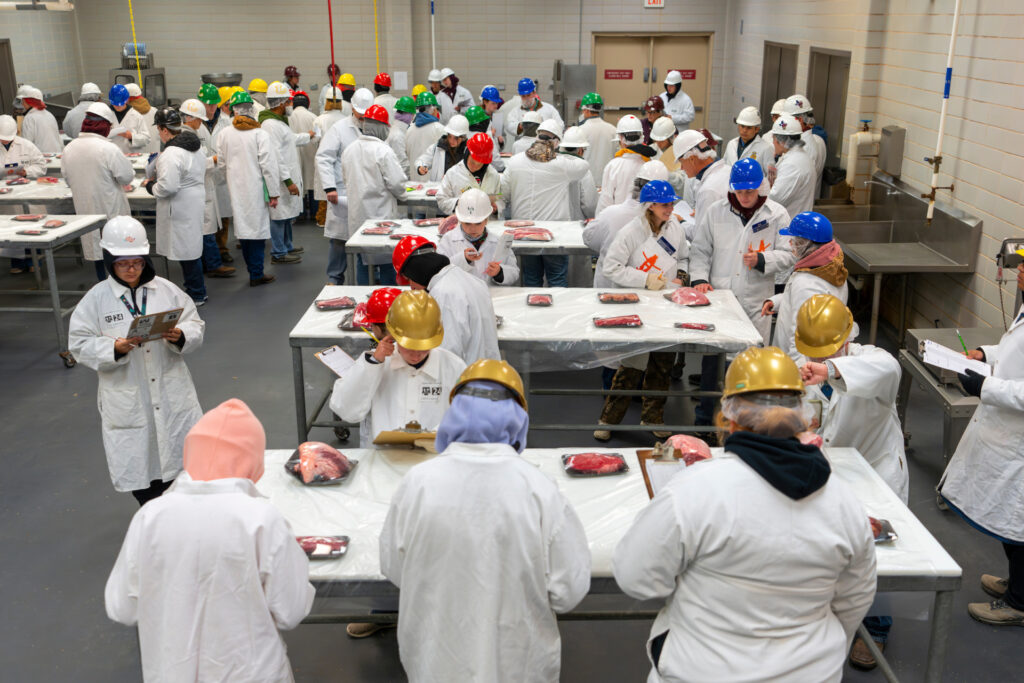
“Our goal is to provide a high-quality practice opportunity for the Texas 4-H and FFA members and offer hands-on feedback about how and why we placed each class the way we did,” Boardman said.
Jennifer Wyle, lecturer and Texas A&M Meat Judging Team coordinator at Bryan-College Station, provided students and their coaches insight into the area of meat judging.
“We gave a broad overview of all the potential classes and retail cuts that students could see in a meat judging contest,” Wyle said. “We provided 13 classes and 110 retail cuts, as well as extra beef carcasses to teach yield and quality grading.”
Like other competitive teams, Wyle said she enjoys the annual clinic because it allows students to learn more about the industry and the meat science program in the department. The clinic also serves as a recruiting opportunity for future Texas A&M Meat Judging Team members.
The horse judging clinic taught the foundational criteria, standards and scoring systems of horse judging contests. Sarah Schobert, lecturer and Texas A&M Horse Judging Team coordinator, Bryan-College Station, said she enjoyed interacting with the young judgers and is hopeful they left excited to learn more about the horse industry and continue their judging career.
“Having more competitors at judging contests is always exciting,” Schobert said. “I hope it also filters into our competitive horse show world, getting more young people who want to ride and compete.”
Passion for educating future generations
Participants’ ages across all four clinics ranged from 7 to 18 years old. The judging coordinators acknowledged that the fast-paced clinics might have posed challenges for younger attendees, but they were nonetheless welcomed and encouraged to participate.
“I think it is great to get kids involved early,” Wyle said. “I love to hear stories about kids telling their parents what cuts of meat to buy at the grocery store once they learn which ones are the best.”
Boardman enjoys seeing the students’ continued enthusiasm and interest in the world of livestock judging.
“This is the start of the spring competition season for these Texas 4-H and FFA members, so they are very eager and excited to learn,” he said. “Seeing their enthusiasm and drive to absorb knowledge is refreshing each and every year.”
Schobert said she recognizes parts of her younger self in the students she teaches at the clinic.
“One of these kids starting out at this critical development level could be a horse judging team coach one day,” she said. “There are so many talented youth looking for coaching and education. Interacting with motivated young judgers and providing this learning opportunity is an honor.”
Impact by the numbers
The annual March clinics provide a solid foundation and attract many students eager to learn about judging. However, the learning opportunities provided by the Texas A&M competitive teams each year do not stop there. With the spring collegiate competitive judging season concluded, the department’s judging teams will offer even more avenues to impact aspiring young judgers across the state.
The judging teams also host camps, serve as officials in district, area and state 4-H and FFA contests, and hold individual contests throughout the year. More than 12,000 youth are estimated to be educated by the department’s competitive teams each year.
“These learning opportunities are profoundly impacting Texas 4-H and FFA youth,” said Clay Mathis, Ph.D., professor and head of the Department of Animal Science, Bryan-College Station. “We are thankful for the dedication our competitive team programs have in educating future generations and look forward to the possibility of seeing these young judgers as students in Aggieland someday.”
More information about the youth programs offered in the Department of Animal Science can be found at animalscience.tamu.edu/youth-programs/. Information about the department’s 10 competitive teams can be found at animalscience.tamu.edu/competitive-teams/.

